Europeans ‘Disappointed’ With Failure To Topple Regime - Grandson Of Khomeini
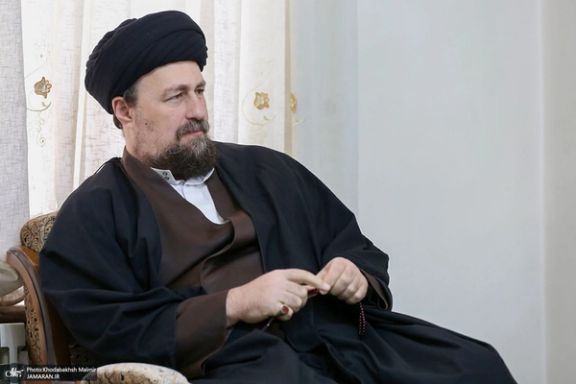
The grandson of the founder of the Islamic Republic Ruhollah Khomeini says European countries are now disappointed with the inability to topple of the regime.

The grandson of the founder of the Islamic Republic Ruhollah Khomeini says European countries are now disappointed with the inability to topple of the regime.
“Those who seek to overthrow the Islamic Republic must be disappointed. Europeans behave differently when they see they cannot overthrow the Islamic Republic,” Hassan Khomeini claimed on Thursday.
Speaking at the mausoleum of his grandfather, Khomeini added that the decision of the judiciary chief and the proposal for the amnesty of prisoners last year was very helpful in “disappointing the enemies”.
Using the term “Enemies” is a favorite of Supreme Leader Ali Khamenei to refer to the United States, Israel, US allies in the region and in Europe.
“Anything that can be used to overcome internal conflicts… creates hope and guarantees the survival of the Islamic Republic.”
In February, Khamenei agreed to pardon some prisoners and reduce sentences for those arrested during anti-government protests in recent months.
In a letter judiciary chief Gholam-Hossein Mohseni Ejei sent to Khamenei young protesters were highlighted, with the caveat that they “were deceived by enemy propaganda,” and since then have expressed remorse.
However, human rights activists including Narges Mohammadi, slammed the Supreme Leader’s amnesty as a sham to feign compassion to the Western world.
In a letter written to the UN Human Rights Council in Geneva from inside Tehran’s notorious Evin Prison, she said the announcement reflects a “politics of the Islamic Republic [which] is based on lies”.
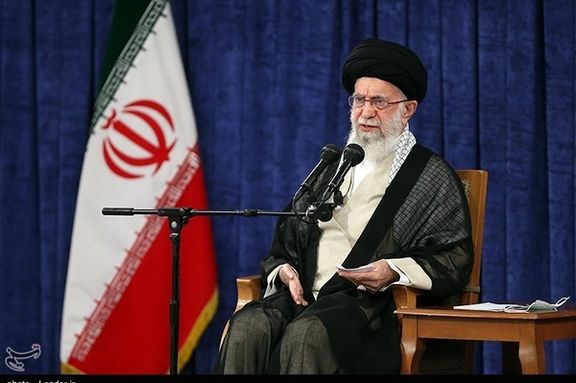
In a somewhat unexpected move, media in Tehran reported Thursday that a meeting was called between Iran's intelligence bodies, signaling possible discord.
The joint meeting of the Ministry of Intelligence and the Intelligence Organization of the IRGC was held June 16 in the religious city of Mashhad.
The session was opened with the message of the Supreme Leader Ali Khamenei who urged for more mutual understanding and synergy.
“Intelligence is one of the most important issues of the country, and one of our weaknesses in relation to intelligence systems is the lack of coordination,” read Khamenei’s message.
The meeting comes as a lack of coordination between the intelligence organizations has led to major cyber attacks from regime opposition groups. Repeated acts of sabotage attributed to Israel have also plagued the Iranian regime since July 2020.
Most recently, a hacktivist group broke into servers of the Iranian president’s office in late May and leaked troves of sensitive data, proving corruption, conflicts, and an ongoing nuclear expansion.
Intelligence Minister Esmail Khatib and the IRGC Commander Hossein Salami were among the speakers of Thursday's meeting, both underlining the necessity of better coordination.
The Secretary of the Supreme National Security Council Ali Akbar Ahmadian and the Interior Minister Ahmad Vahidi also called for a joint strategy.
It seems that there are deep rifts between the IRGC and the Ministry of Intelligence and Khamenei continues to heal the rifts but with over a dozen bodies involved in the country’s security, none of them want to lose its dominance.
However, multiple intelligence services were created during Khamenei's 34-year-old rule.
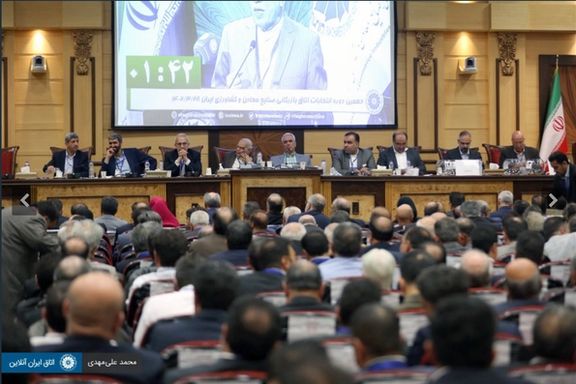
Around 30 lawmakers have urged the government to recent annual elections at the Iran Chamber of Commerce, which sometimes voices independent opinions.
In a letter to the newly appointed minister of industry, mines and trade, Abbas Aliabadi, published by the hardliner Tasnim news website, these lawmakers said the position of the chairman of the chamber, which represents the private sector, is considered as a “significant and sensitive position according to law”.
In elections held Sunday, Hossein Salahvarzi, a businessman who has been an outspoken critic of the government, was elected as chairman.
One of the two candidates who ran against Salahvarzi, Younes Zhaeleh, is known to have close ties with the government.
Salahvarzi obtained 265 votes against 95 votes for Zhaeleh and 62 votes for Hossein Pir-Moazzen.
The chairman of the chamber which has over 400 members has the role of coordinating between the private sector and the government and is sometimes required to participate in meetings with government officials.
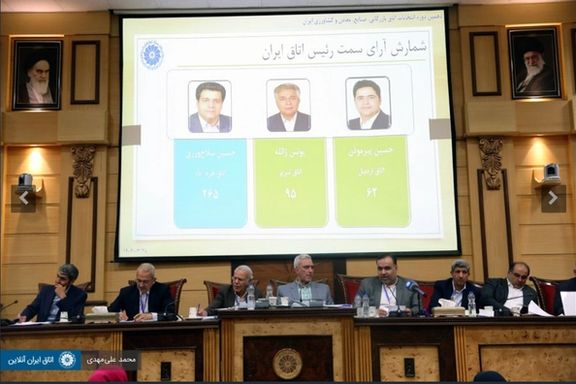
Therefore, the lawmakers argued, the newly elected chairman who they claimed had supported the recent protests and those who sought to overthrow the Islamic Republic, should not have been allowed to run.
The chamber of commerce is a semi-independent organization, which like media outlets is monitored and controlled by the regime. An outright opponent would not be allowed to run for its chairmanship.
“Did the country’s security and supervisory bodies take national interests as a joke” they asked and said Salahvarzi had not been approved to run by the ministry’s security department.
Tasnim also claimed that “security and supervisory bodies”, presumably the ministry of intelligence and IRGC’s intelligence organization (SAS), have referred to “financial [corruption] cases” for Salahvarzi’s disqualification in their correspondences.
Donya-ye Eghtesad, an economic daily, reported that until Saturday evening it was still unclear whether the chamber’s elections would be held according to schedule the next day due to the controversies over the vetting of candidates including Salahvarzi.
Iran Chamber of Commerce often referred to as “private sector’s parliament” has around four hundred representatives who are annually elected at the provincial level.
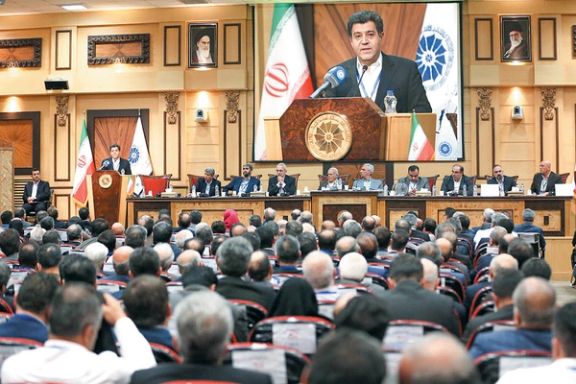
The last elections of chambers of provinces were held on March 11 instead of February 29 because a supervisory body disqualified over 40 percent of candidates, delaying the vetting process.
Mehdi Karbasian, a former deputy minister of industry who represents several high-profile companies, and Masoud Khansari, the then incumbent chairman of Tehran Chamber of Commerce, the most influential chamber in the country, were among the disqualified candidates.
Khansari and other members of the chamber had criticized regime policies that have led to an economic crisis, including a confrontational foreign policy.
Authorities said the vetting was based on a recent regulation that required candidates to have at least two consecutive years of membership in chambers of commerce, to have paid insurance for a minimum of twenty employees during the past year, to have had a minimum annual turnover of 150 billion rials, and to have also been awarded for exports by the Trade Development Organization.
However, some Iranian media outlets such as Aftab News which is close to former President Hassan Rouhani and the Moderation and Development Party alleged that the real reason behind the disqualifications was political as these candidates had been speaking against the government of President Ebrahim Raisi and its policies.
“The ministry of industries, mines and trade and the government are trying hard to shift the control of the chambers, particularly the chambers of Iran and Tehran, to a certain political faction,” Aftab News quoted one of the disqualified candidates who did not want to be named as saying.
Another daily, the reformist Etemad newspaper, predicted that the elections would be engineered to shift the control to government supporters.
Chambers of commerce often produce economic reports that the government finds embarrassing, or they criticize proposed budget bills and other plans.
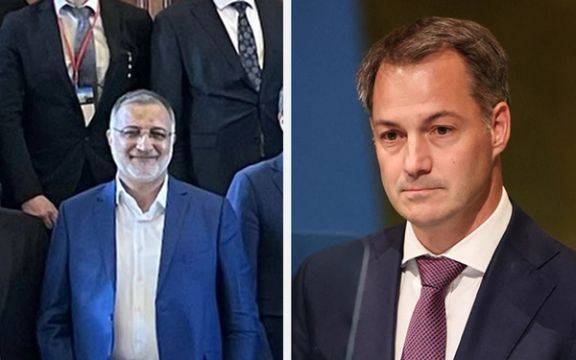
Belgian lawmakers Wednesday questioned PM Alexander De Croo and Foreign Minister Hadja Lahbib for allowing officials from Iran and Russia to attend a mayors' convention in Brussels last week.
Lahbib especially is under scrutiny for having approved visas requests while Iran and Russia are under international sanctions and only three weeks after Belgian NGO worker Olivier Vandecasteele was released from an Iranian jail. He was exchanged in a controversial move with a former Iranian diplomat convicted in a Belgian court of leading a terror plot in Europe and serving a long prison sentence.
De Croo and Lahbib said they didn't want to risk a diplomatic row with Iran close to the release of Vandecasteele and three other Europeans, but lawmakers from opposition as well as coalition parties contest that reasoning.
When in Brussels, the Iranian delegation filmed Belgo-Iranian lawmaker Darya Safai and Iranian opposition members, Belgian national broadcaster RTBF reported.
Safai, who was a prominent activist in Iran before fleeing to Belgium in 2000, said she no longer felt safe in Belgium.
Tehran' mayor, Alireza Zakani, is known as a hardline Iranian politician, who was a member of the Revolutionary Guard’s Basij militia.
The opposition has called for Lahbib's resignation, while extreme-right opposition party Vlaams Belang also asked for De Croo's resignation.
State secretary for external relations of the Brussels government Pascal Smet resigned on Sunday over the all-expenses paid trip.
Reporting by Reuters
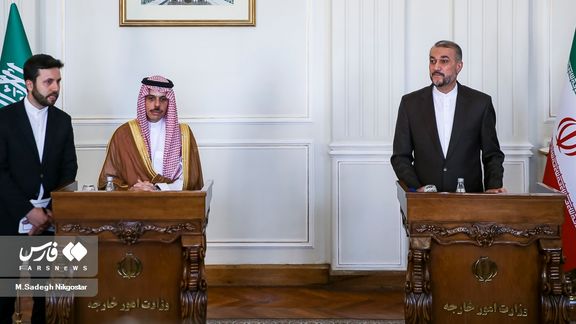
Heated debates in Iran continue about Tehran's ties with Riyadh following an incident during the recent visit of Saudi Foreign Minister Prince Faisal bin Farhan.
The controversy ensued when at the conclusion of talks between bin Farhan and his Iranian counterpart on June 17, the venue of their joint press conference was suddenly changed.
While the Iranian foreign ministry spokesman and the state television insisted that changing the room was "due to a technical problem," Iranian reporters on social media insisted that the Saudi delegation refused to sit in a room where a big portrait of former IRGC Qods Force Commander Qassem Soleimani was posted on the wall.
Foreign policy analyst Diako Hosseini wrote in a tweet: "The Foreign Ministry should have been intelligent enough to predict the Saudis' sensitivities. Now that the ministry was not intelligent enough, the minister should have cancelled the news conference."
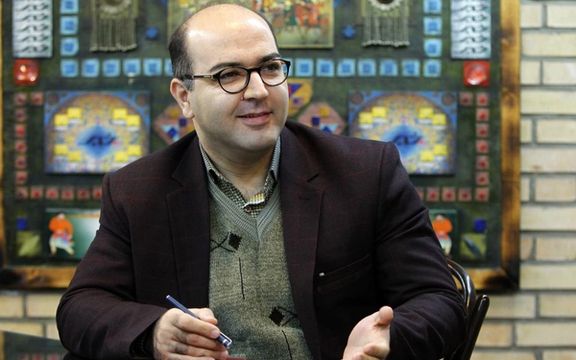
An Iranian commentator in Paris, Mohammad Javad Akbarin tweeted: "In 2019 Soleimani wanted to bring Syrian Leader Bashar Assad to a meeting with Supreme Leader Ali Khamenei to attract media attention. Instead, it was [foreign minister] Zarif's threat to resign that became the day's news. Now, the general's picture has undermined all the achievements of the visit by the Saudi delegation. Dead or alive, Soleimani has always brought about a loss for the country's diplomacy and national interests."
Zarif was apparently caught off guard when Assad showed up in Tehran and was not even invited to the meeting with Khamenei.
At the same time, prominent Saudi columnist Mohammed Alsulami wrote in a series of tweets in both Arabic Persian that "Trust between the two countries is fragile and comments made by some political figures close to Iran shows how difficult is rebuilding mutual trust." He further called on Iranians to avoid using sarcastic language about the Iran-Saudi ties as the Saudis are not interested in “factional rivalries in Iran.”
At the same time, foreign policy analyst Ali Bigdeli told Nameh News website in Tehran that "Not all the problems between Tehran and Riyadh will be solved with a visit to Tehran by bin Farhan. He added that "Some Iranian officials have said that America’s hands will be cut off from the Middle east following the agreement between Iran and Saudi Arabia, but this is not true."

He added: "We still do not have full diplomatic relations with Saudi Arabia. The Iranian ambassador to Riyadh has still not received his credentials from the King." He said in another part of his interview that Saudi promises of investing in Iran may not materialize as long as US sanctions against Iran are in place.
Bigdeli argued that Iran should follow a dynamic policy like Saudi Arabia and maintain healthy ties with both East and West rather than pinning all its hopes on the East.
Meanwhile, moderate news website Entekhab wrote in a commentary that two years after President Ebrahim Raisi declared Iran's policy of expanding ties with China, Iran's "looking east policy" has not been as successful as Saudi Arabia's relations with China.
The website wrote that despite signing a 25-year cooperation agreement with China, Iran's share of trade with Beijing only amounted to half a percent of China's international trade in 2022.
Generally, the total trade volume between Iran and China was less than $16 billion while Saudi Arabia maintained an annual trade of $106 billion with China in 2022, Entekhab maintained.
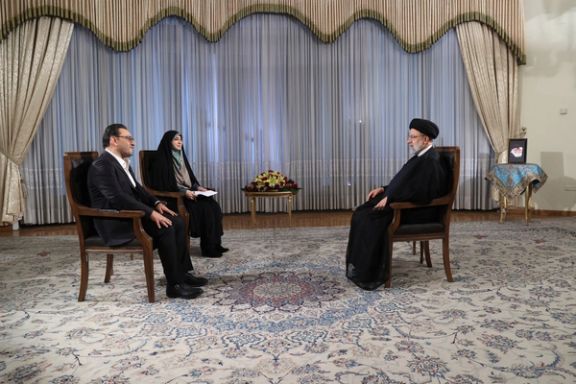
Enemies fomented protests in Iran to derail “progress” that his government was making, Iran’s president Ebrahim Raisi claimed in an interview with state television.
While sharp criticism about the deteriorating economy and “mismanagement” by Iran’s hardliner government has increased by both friends and foes, Raisi tried to present an acceptable picture of his performance by making claims and citing misleading or cherry-picked statistics.
The televised interview Tuesday evening was aired on the second anniversary of his win in the 2021 presidential vote that had none of the attributes of a competitive race. His most serious rivals were disqualified by the Guardian Council, a non-transparent body controlled by regime insiders loyal to Supreme Leader Ali Khamenei.
Raisi repeated the regime’s unsubstantiated claim, first made by Khamenei, that the nationwide ‘Women, Life Freedom’ movement was a conspiracy by enemies to derail the success of the regime.
“The esteemed leader of the revolution indeed correctly proclaimed that the basis of the riots was the fact that enemies felt the country was moving toward progress and hope was returning to the people,” Raisi said about Khamenei drawing the line and defining the cause of the protests.

Regime officials never use the word ‘protest’ when it is about Iran. All anti-government demonstrations are ‘riots’.
The head of the Revolutionary Guard intelligence organization, Mohammad Kazemi claimed this week that 20 foreign secret services were involved in planning and organizing the protests that began last September when a 22-year-old woman was killed in ‘hijab police’ custody.
Raisi even claimed that nuclear talks with the West came to a halt because of the protests, while these negotiations hit a snag in the end of August or early September 2022, weeks before the anti-government movement began and the extent of the violence against protesters was revealed.
The United States said many times in 2022 that the Islamic Republic had presented “extraneous” demandswhen the European Union mediators presented a compromise draft agreement in mid-2022.
The bloody government response to protests that eventually took more than 500 civilian lives did become part of the US reasons for not pursuing a return to the JCPOA nuclear deal, but the first signs from Washington emerged in October and had nothing to do with the initial impasse in negotiations.
Raisi also made a series of misleading statements on the economy, including a claim that inflation dropped during his presidency, while Tehran media in May reported an inflation rate close to 70 percent.
Worse of all what he ignored to mention was a devastating drop in the value of the currency, rial, since September 2022. The rial, which was trading at around 280,000 to the US dollar in mid-2022, dropped to as low as 550,000 in early May. It is now trading at around 490,000. In short, the rial’s value almost halved in less than a year, with an incalculable damaging impact on the inflation rate in the months to come.
But the president in his interview tried to blame the war in Ukraine, which did have an inflationary impact on global prices, but nowhere near 70-percent inflation.
Iranian observers are at a loss to explain extravagant and demonstrably false statements by officials. Is it ignorance of facts, rosy reporting by bureaucrats to senior politicians or an outright and deliberate attempt to justify their failures?
Raisi’s statements come against the backdrop of reports about direct and indirect talks with the United States to reach an unwritten deal so the Tehran can receive some badly needed foreign currency if Washington agrees to allow its frozen funds in Iraq and South Korea to be released.